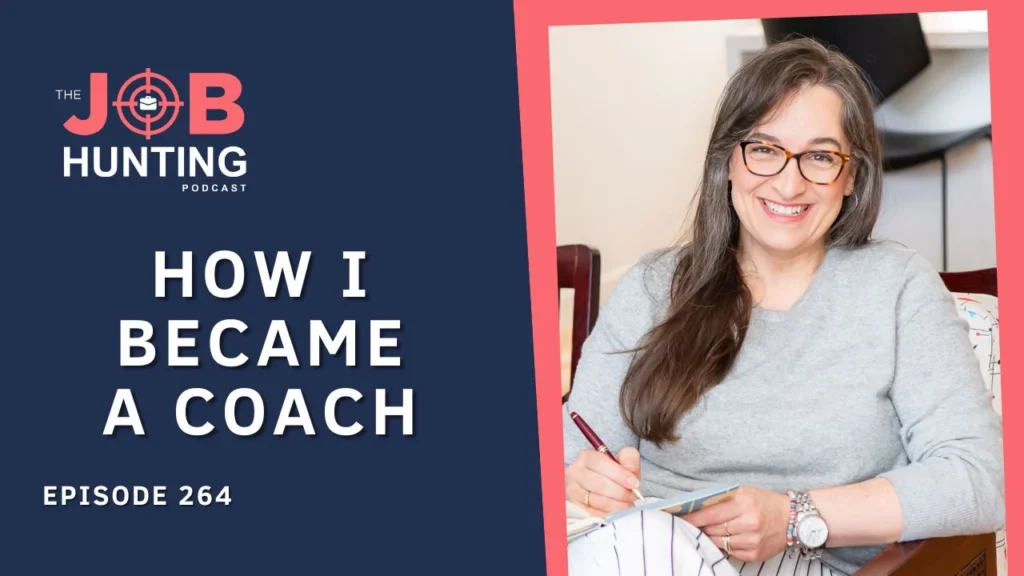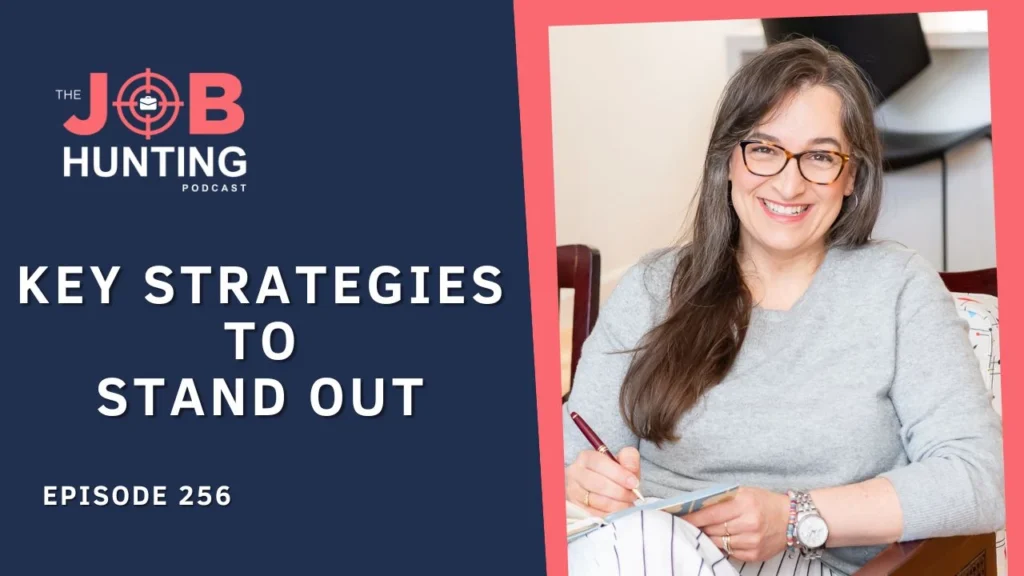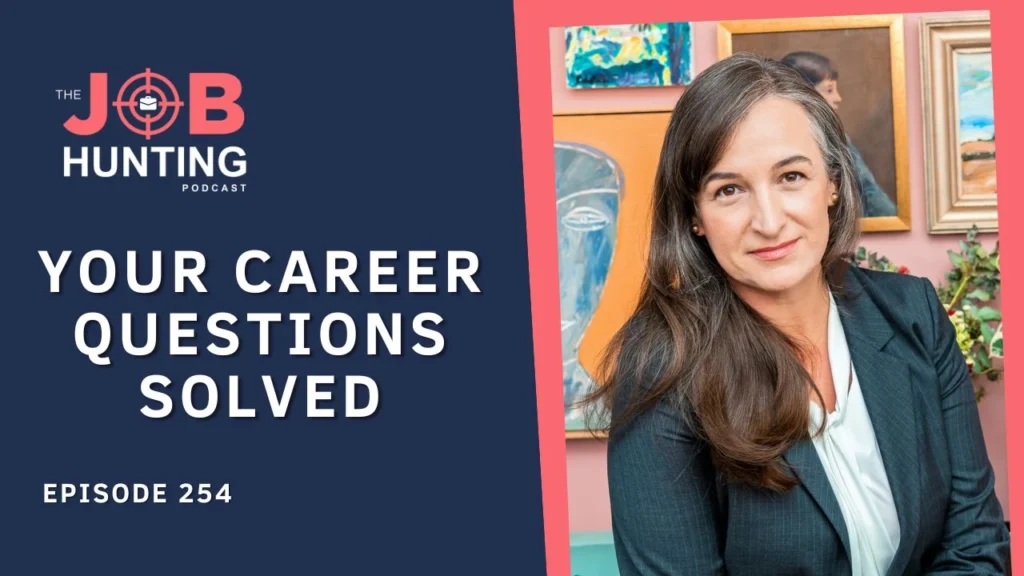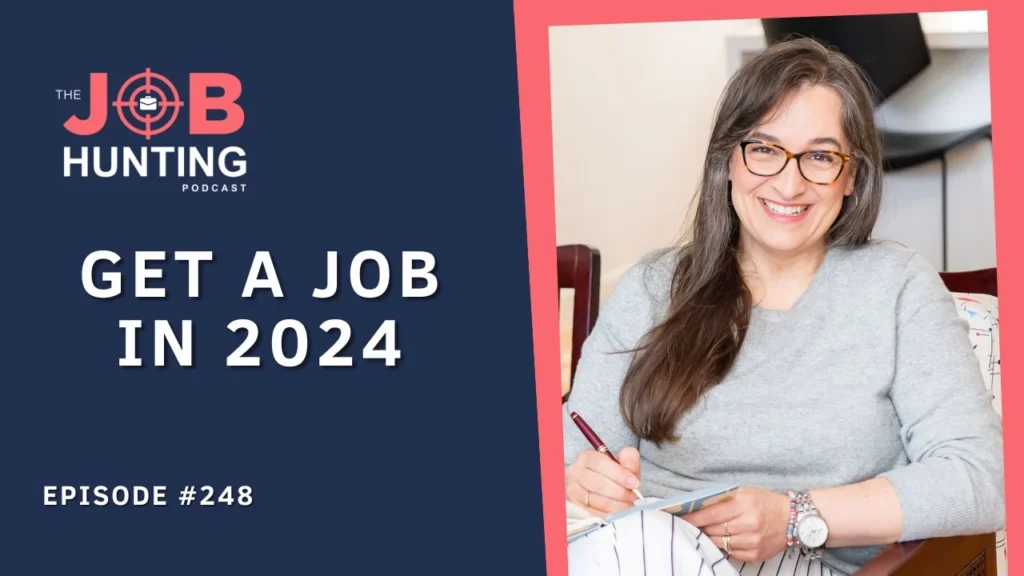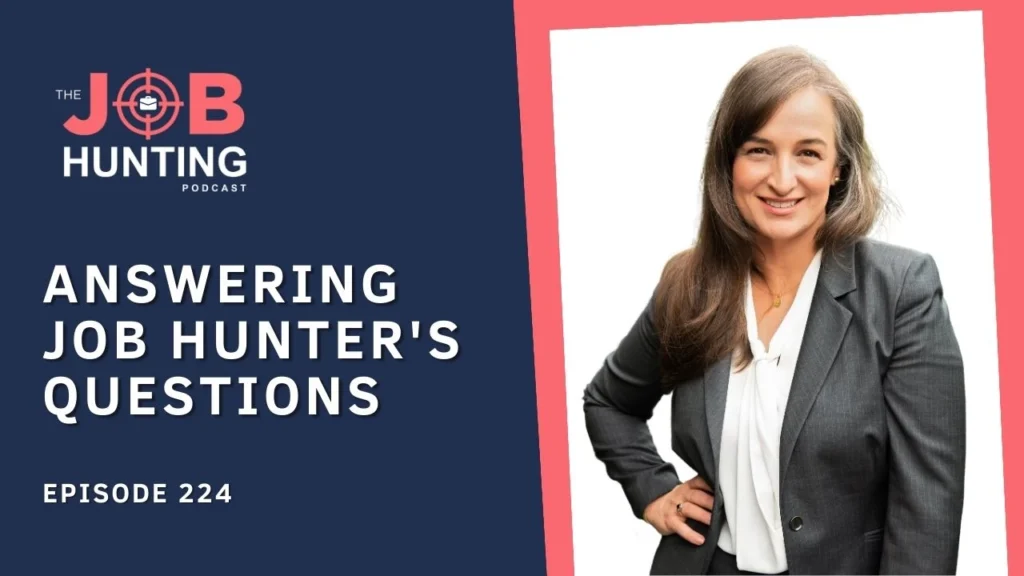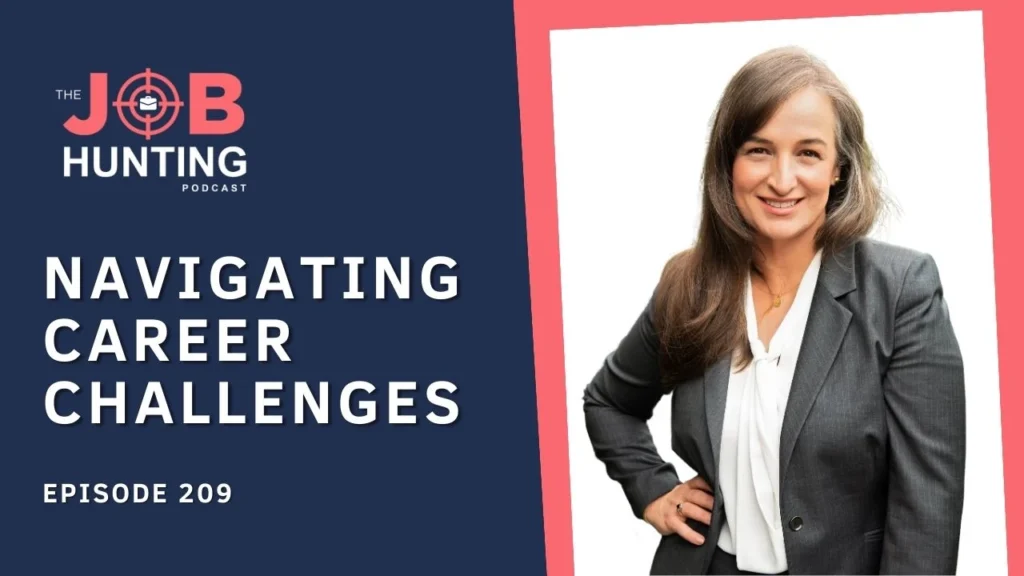First question: What is your number one job-seeking advice for a former executive, aged 52, who has been running her own consulting boutique business for six years and is looking at returning to the corporate world? That’s a very interesting question for me because I’m also 52.
So, I can see myself in this situation, even though I’m very happy where I am with my business. Back in 2019, I stepped out of the corporate race. My role was made redundant at the end of 2018, and at the beginning of 2019, I decided I wanted to start my own business. I went ahead, set it all up, and have been doing it ever since.
But it’s interesting to put myself in your shoes. If you’re also 52, and I’m 52, what would be the number one thing that I would do if I were in your place? I think the number one job-seeking advice from me would be to have a crisp and clear story, a great value proposition that you can deliver to the people in your network who now need to understand your rebrand, right?
And that’s fine. You rebranded when you stepped out of your executive roles into your business, and now you’re rebranding again, willing to go back into the corporate world. And I think it’s totally feasible. In fact, there’s an interview with Karen James on the Job Hunting Podcast, episode 60.
There will be a link in the episode show notes, but wherever you found this podcast, it should be easy for you to find episode 60. It’s kind of an old one, but a goodie. Karen has gone through lots of rebrands in her career. She stepped out of a very senior role, had her business for, I don’t know how long, but probably around six years, which would be about right, and then went back into an executive role again. So, leveraging also from your consulting experience, if I can give you more than one piece of job-seeking advice, expanding on that crisp and clear story, would be to leverage from that consulting experience, highlighting the experiences you gained while running your consulting business and emphasizing how these can bring unique values to a corporate role. In fact, I have clients who have gone through exactly that. Right now, I have a client coming back from having set up a startup. I’ve had clients who had consulting businesses and are now back, fully employed in the corporate sector. And it’s really about accepting and engaging with what you’ve learned from your consulting experience, plus providing recency of your understanding of the corporate sector, especially the industry that you belong to, that you want to go back to, if that’s what you want to do.
Focus on achievements like problem-solving, client relations, and project management that are directly transferable to the corporate environment. And do a lot of research through conversations, gathering of intelligence, and reading material to understand what the corporate environment looks like. Because frankly, post-pandemic, so much has changed.
Second Question: How do you go about cold-calling companies you want to work for? That is such an interesting question. It’s often something that I read a lot in Forbes articles, LinkedIn articles, or YouTube advice. Even in my podcast, I’ve had recruiters saying, “You should just go ahead and cold-call recruiters or companies.”
Frankly, it’s not that easy. There is an episode with Kyle Samuels on my podcast, episode 226. I will put a link in the episode show notes, so have a listen. I even extracted a clip where he says something along the lines of the fact that LinkedIn and Twitter, or platforms like them, give you access to connect with so many people, which might give you the wrong impression that you are only one degree of distance away from someone like a CEO or someone within a company you want to work for. But I think it’s more complicated than that.
First of all, I would do thorough research. I always say this, but it’s true – before reaching out, research the company, understand its culture, recent developments, and key challenges it faces. For example, I own a company, and people reach out to me on LinkedIn or by email, asking basic questions about my company that they could easily research online, like what services we offer. This would be the first thing you need to do.
The second thing would be to identify the right contacts. Finding appropriate individuals to contact is key. They could be hiring managers or department heads within your function or expertise. Using LinkedIn or the company’s website is ideal.
You can also do this with recruiters. Recruitment firms have thorough websites with detailed bios of each of their recruiters or executive search partners. So, make sure that you adapt this recommendation to recruiters as well. Then, craft a personalized message. Write something concise. You don’t want to write a very long essay as an email or a message, but something that truly expresses your interest in the company or that person and how your skills and experience might align with what they’re trying to achieve.
If you know the issue or project, also identify the right context. You might first see if you have any first-degree connections in the organization so that you can reach out to them, even if they are not exactly aligned with your area of expertise. Just gather intelligence and say, “Look, I’m thinking about contacting such and such within your organization. I really want to learn more and see if there’s an opportunity for me to one day step in and help. What do you think?” So, ask for their advice and get ready for the conversation because nothing is more nerve-wracking than reaching out, sending the email, and then all of a sudden, they want to talk to you.
I’ve had this situation with clients before. We have a coaching session, they ask, “Should I reach out?” And I’m like, “Yes, reach out.” Together, we draft the best possible message, succinct as I said. We work together, they reach out, and then, minutes later, they get a reply back. They call me and say, “Oh my God, look what happened.” And I’m like, “Okay, let’s get ready for that conversation.” You have to be ready. Again, be succinct in discussing your background, have a good pitch to convey how you can contribute to their company, and have a few insightful questions ready as well.
All the pre-work involved, frankly, when you work with a coach, may sound like there’s a lot of work to be done before you engage in activities such as emailing and applying for jobs and having conversations. But that pre-work gives you the confidence for those conversations to flow. You’re ready for them.
What else? Respectfully follow up. If you don’t hear back, send a polite follow-up message, maintaining a balance between showing interest and respecting their time. That’s probably the hardest thing to do. One thing I often tell my clients is not to assume anything. If people haven’t reached out to you, it doesn’t mean they don’t want to talk to you. It just means they’re too busy. So, reaching out a couple of weeks later is fine, but then that’s it.
It’s all about nurturing.
Question Number Three: How do you strategically select your network, and how do you connect with them to sell your pitch in order for them to help you find your next role?
That’s an interesting question. It sounds transactional, even in the language it uses, like “selecting your network” or “selling your pitch.” When I work with clients, I move away from transactional networking because, frankly, I haven’t seen it work. It doesn’t work. You have to think of persuasion and collaboration in two different ways.
If you’re buying a car or a house, and you will never work with that seller again, then you want to be very transactional because you want to make the most out of your negotiation and persuasion and get the best possible value for your money. That is one way of interacting with people.
On the other hand, when you have a career that will span, say, 20 years or more, you need to engage with people time and time again. Depending on your sector, industry, and geographical location, that network will be with you for a long time. It will normally be a small group of people who all know each other and have worked together or been clients or suppliers.
What you want to do is to be someone who is of service to your network, as much, or even more, than being of service to you. Don’t worry about being strategically selective about your network. Frankly, you never know where your new job will come from. It could come from a recommendation from an executive assistant, or from the husband or wife of your future employer. You never know. I once had a client who had her dream job in mind at an organization in her town, but she had no connections there. However, her husband was a music teacher who taught a little boy whose parent worked at that organization, and that’s how she got her connection and her interview.
There is no rhyme or reason. The more doors you leave open and the better you are at tailoring your message to different audiences, whether young, old, within your sector, or outside, the better. Ideally, you want everyone to understand what you do in the best possible way, for their age or level of understanding, and to keep you top of mind in their conversations with others so that if there is an opportunity for you, they will reach out to you.
That’s all about personal branding, which is, in fact, something we just looked at inside the group coaching program. It’s the third module that we addressed this morning, just before I’m recording this episode.
So, having said that, these are the things I think you should focus on when working with networks:
1. Identify key influencers: They don’t necessarily have to hold a leadership position. Focus on individuals in your desired industry who are in positions of influence. They could be hiring managers, industry experts, leaders in companies of interest, or just people with a good network and connections.
2. Look at mutual connections: Look for potential connections through your existing network, including former colleagues, alumni, or professional group members.
3. Engage authentically: Initiate contact by engaging with their content on platforms like LinkedIn or Twitter, and reach out with a personalized message that reflects your interest in their work. I once attended a conference with a young professional. We were sponsoring the conference, and there was a senior CEO presenting. His speech was a big milestone in Australia, making news everywhere, and she was impressed by him. Despite being much more junior, she took the strategic step to reach out to him on LinkedIn, complimenting his speech and expressing her desire to connect. They ended up having coffee together, which was impressive and meaningful for our organization.
4. Offer reciprocal value: Approach networking as a two-way street. Show willingness to offer support and insight in return, and foster mutually beneficial relationships. Professional networking should never be transactional.
Question Number Four: What are the most common challenges when changing sectors, and what are some of your top tips for dealing with these changes?
Yes, changing sectors is a topic I often discuss. When I talk about sectors, I’m thinking of government, corporate, nonprofit, but this also applies to different industries. For example, moving from mining to energy or banking, or from fashion retail to a professional association.
The key consideration is how to best showcase your transferable skills. Professionals often worry about whether their skills will align with a new field. It’s crucial to identify and highlight these transferable skills, especially conveying them in a way that adopts the jargon and cultural cues of the new sector or industry. Knowing how to speak the sector’s or industry’s language will make you a much better candidate.
How do you learn that? By reading about the industry, understanding industry publications, attending conferences and events, making connections in that industry or sector, and having conversations. Not conversations about getting a job, but ones where you ask, “Tell me about your sector. What do I need to know if I want to move into the nonprofit sector or into government?”
Then, you need to build a new network for these conversations. Attending conferences is a great way to do this. In fact, I was just prepping a LinkedIn post about this. I’ve noticed that my private clients who attended conferences at the end of 2023 are having much better success early in the year with their recruitment processes than those who didn’t. These are clients trying to change industries, sectors, or even countries, and attending these conferences and events has expanded their networks.
For someone who has spent years in one sector, starting from scratch in a new industry or sector can be daunting. Networking through professional platforms or industry-specific events is essential. Not just LinkedIn – go above and beyond.
Do you need further training or education? Maybe you do. I remember hiring someone at my previous job who had a good understanding of industry and government partnerships but in a different country. We paid for her to do additional training in public-private partnerships (PPP) so she could transfer her skills to an Australian setting. This contributed significantly to her ability to adapt and thrive in a new environment.
Your unique professional experiences from different careers can be very marketable in a new sector. For example, employers often value diverse perspectives. Some nonprofits want to be more commercial, so use that to your advantage.
Finding mentors is another great way to navigate sector changes. If you’re on a new career path, try to find mentors who can guide you. Look for experienced professionals within that industry or sector for guidance and advice.
Question Number Five: What recruitment companies are leading the market when it comes to generalist roles?
This question pertains to finding the best recruitment companies for generalist roles. Regardless of your role, the best thing you can do is use Google, especially since this podcast is listened to in over a hundred countries. I’m sometimes surprised that people don’t realize this, but if you visit recruitment firms’ websites, they usually list their areas of expertise. Most even go beyond that, listing every recruiter working there with a small bio. In these bios, they might include job titles they’ve recently advertised, giving you a good idea of whom to contact within these firms.
It’s important to understand the difference between recruitment firms and executive search firms. Executive search firms typically handle only senior executive roles, while recruitment firms can manage both senior and more general roles. My advice is to conduct your own Google search. While there are some international companies, this doesn’t mean you won’t find great local recruiters. The best approach is to do the search yourself. Even if you were working with me, I would still encourage you to initiate the search. I could show you the best ways to conduct searches, but I’m pretty sure you can at least start doing it yourself, DIY-style.
Question number six: I’m struggling with key selection criteria. I have examples of my responses and the questions I receive. However, I don’t think I am on the right track. I need your help to identify what I’m doing wrong in my approach.
Well, okay. Addressing selection criteria is not something that everybody in every country needs to do. So, if it’s not something that’s common in your country, skip this question. You don’t have to listen to this bit.
But if you are in Australia, the UK, or some places in the US, especially in government roles or roles within higher education, and even in non-profit organizations, they will ask you to provide a resume, a cover letter, and address the key selection criteria, which sometimes can be a third document.
Sometimes, the instructions are to include addressing the key selection criteria in the cover letter or included in the resume. The most important thing is to read the instructions. If you can’t find the instructions on how to address the key selection criteria in the job ad, it could be on the website, either the company’s website or the recruiter’s website. If you can’t find it anywhere, reach out to the recruiter and ask, okay?
I recently helped someone who had applied for several roles, where he was the ideal candidate. He was a very well-versed individual who had done a great resume and a great cover letter but did not get an interview. Right? So, he reached out to me. He sent me the job ad, the cover letter, and the resume, which is something that I often tell people to do when they’re booking one-hour consultations with me.
Go to my website. You can see how that works. And I said, “You haven’t addressed the key selection criteria.” So, if you see those words in a job ad, “key selection criteria,” you know that has a specific meaning in the recruitment world, and you may need to address it in a specific way. So, either you go to that university’s website or that department’s website if it’s a government department or a non-profit, or the recruiter and find out how they prefer you to address it, or you reach out directly to the recruiter if you are able to. In his case, we couldn’t find anything. So what we did was we added to the cover letter a statement addressing the key selection criteria, and we addressed each of those criteria. One of them, I think there were four or five, with a short paragraph that made the cover letter a bit longer, two pages instead of one page, which is my preference.
But that was fine. And he got an interview and he got the job. So, I’m not saying this is the only reason why he got the job. I’m sure he did very well at the interview. But at least he got an interview, which he wasn’t even getting before. So, never underestimate how important it is to understand the recruitment process.
Understand and recognize that employers and recruiters use specific words, like ‘key selection criteria’, to denote what it is that they want from you. Addressing the key selection criteria might be something you need to do. When addressing the key selection criteria, the best way is to use the STAR method.
There are many websites that give instructions on how to address key selection criteria, and I’m talking about the employer’s website. So if you go to the careers section, you know, they might have detailed information there. I’m thinking about another client who was very good at creating a statement addressing the key selection criteria as a third document, and she was applying for roles.
I remember it was a library role, so she was applying to work in a library. I said, ‘This is very good, but this actually doesn’t match the instruction on that library’s website.’ So, you know, even if you know how to address key selection criteria, the library had a specific way it wanted the candidate to address it.
Again, that was a one-hour consultation with me, and we got that fixed for her, and she understood it. But the STAR method is very universally understood and a big requirement for job interviews, and also in how to address key selection criteria: situation, task, action, result.
Making a succinct paragraph to explain this is the best thing to demonstrate that you can do whatever it is that they are asking you to do as one of the key selection criteria. Usually, organizations that require you to address key selection criteria are sticklers for protocol, process, and procedure.
So, not only should you make sure that you are addressing it in the way that they want, but also make sure that you proofread and review it. I find that in the past, there were lots of typos and grammatical errors in job applications. Now, because people are using AI to do them, usually what they forget is that ChatGPT is American.
So if you’re in the UK or Australia, for example, you might need to change that to Australian English or British English. So make sure that you make those changes. And of course, ensure there are no grammatical errors. And, you know, I think that’s a really important thing to remember, not just for the statement addressing selection criteria, but for your entire job application.


